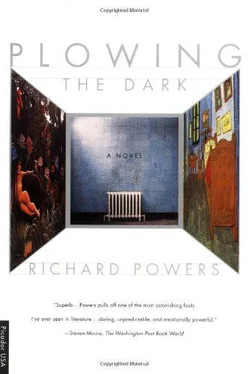Not a perfect clarinet, mind you. Or rather, a tad too perfect. But Zimmerman wasn't about to quibble over sound quality. He had his Esterhazy in a box — every instrument of the orchestra at his beck and call, around the clock, each one capable of playing beyond the range of earthly instruments. He scored out music on the screen, just as he did on paper, and the miraculous music box performed every aural event he cared to specify.
The possibilities outstripped not only his wildest expectations but also his wildest ability to expect. For the first time in his life, Ted could hear the contour of his thoughts as he thought them. The tireless box played a presto stream of hemi-demi-semiquavers all day long without hobbling a note or pausing to breathe.
He set aside all concern for the possible and began to compose the music he most wanted to hear. The box realized anything that Zimmerman could describe to it. He wrote a piece for twelve piccolos in narrowest brilliant tessitura. He wrote a sonata for cello and piano that kept the piano in a perpetual pianissimo and never let the cello out of murderous thumb position. He wrote a frenetic solo for bass clarinet, thirty thousand high-speed notes leaping and crashing through all registers so jaggedly that no human could dream of bringing it off. He played the piece for Spiegel over the phone. Even through the tiny acoustical portal, the effect was dizzying.
Once Spiegel opened the channel, the phone became Ted's favorite obbligato instrument. If the thing rang in Seattle any time before eight in the morning or after midnight, odds were good that the voice at the other end would kick things off with a cheery "Lebanon, here!" A call might last the better part of an hour, Ted ecstatic with
extended show-and-tell. "Wait," he'd say, his voice slurring in its great, decade-long rallentando. "Listen to that same passage played by a brass quintet." And he'd crash around making the changes, Spiegel hearing, in the struggle, just how bad things had become.
"Don't hurt yourself," Spiegel told him. "Send me a tape."
Not the same. Ted wanted the thrill of a live performance. And he could still manage all the controls, given time.
It worried Steve. "Are you OK out there by yourself? I mean, it sounds as if a lot of gear is hitting the floor with considerable frequency."
"And I most frequently of all. Never fear. There's a woman who comes by…"
Of course there was a woman. What had Spiegel been thinking? Two, in fact. A colleague who taught English at the prison. And Zimmerman's widowed landlady, who rented him three rooms in her antebellum house with its twenty-foot ceilings for $200 a month. From each according to her abilities.
In some lingering need for an audience, Ted called more often. For a while, they were in better touch than they'd been since that spring of their mutual discovery. But however often they spoke, that spongy, deteriorating voice on the other end shocked Spiegel. Not a gradual descent: a fall headlong down the staircase. Ted called to lecture, to hold forth, to assign belated homework, but mostly to play the world premiere of another fifteen measures. Now and then he remembered to ask Spiegel how things were going on the other end.
And then the bolt from the blue. The lottery: what anyone else but this crippled anachronism would have called his lifetime lucky break. An old virtuoso friend from Columbia days commissioned Zimmerman to write a piece for solo viola, for performance in the downtown New York avant-garde music demimonde.
You never knew about it? Steve asked the adult Adie. Years failed to erase his surprise.
Never.
It was performed a few times. Once in a space in TriBeCa, in fact.
The city's new music scene is pretty big, Stevie. Hundreds of concerts you never hear about, every day.
He was sure you knew about it. That you deliberately stayed away. It crushed him that you never showed up.
Crushed him? He said it crushed him?
Well, not in so many words.
The piece was as full of antinomian cheek as Zimmerman could manage. But for this audience bred on halting dissonance, he delivered lines as long and soaring as Dives and Lazarus. A theme and variations, no less, on the old fugueing tune "Idumea": beautiful, visceral, expansive, and, given the venue, hopelessly banal. The dedicatee almost refused to play the piece, so startlingly unshocking was it, so potentially damaging to an experimental reputation.
He did it to provoke the provocateurs. Said it was his Abschied to the innovating world. You know: "It's not like I'm ever going to make it back to the city anyway."
Idumea. I can't believe it. Idumea.
He also said that you…that you…
…used to walk around the apartment humming that tune.
Naked.
He told you that? How dare he?
How dare anyone? "Idumea" drew as many silent sneers as he Sacre had once drawn catcalls. Shape-note Americana, second-rate WPA, half a century too late: the wry joke of a very select crowd, over the run of a very short season. But the gorgeous solo viola line lodged in the heart of at least one listener, a slumming double agent whose day job consisted of producing commercial musical scores. The fellow had been looking for someone who could do a thirty-second derivative Copland knockoff, and chance had led him to that someone.
Zimmerman never hesitated. It shocked Spiegel, and saddened him. But working for TeraSys by then, Spiegel had little moral leverage to preach against selling out. Ted worked up the piece in a little under three weeks. It was "Simple Gifts," returned to sender. Thirty seconds of hosanna from the world's first, radiant hoedown. Heavenly counterpoint, put to the service of a multinational consumer-products conglomerate intent upon wrapping its insidious agricultural chemistry in the patina of Shaker innocence.
He did that? That was Ted? Adie, incredulous, remembered the commercial spot. Remembered it in the back of her throat. The kind of manipulative, nostalgic sound track that you wept over in the solitary shame of your living room, with all the shades pulled down.
The delighted corporate sponsors paid Zimmerman well. Ted made a hundred times more for those three weeks of work than he'd made for all the other music he had composed in his life. The lump sum helped to cover what the prison college's group insurance refused to pay, when Ted at last had to move into Warren County's second-best assisted-care facility.
Life was truly long. Ted spent his days strapped in a bed in a nursing home in the Buckeye state, a forty-year-old avant-garde composer surrounded by the perfect audience: deaf nonagenarians. At least he had a private room — a cinder-block single compartment, the same dimensions as the one his old friends now redecorated.
Ted and Steve had spoken only twice since Adie's arrival out West. Spiegel stopped calling him. Ted could no longer hold the receiver. Even after one of Ted's nightingales bought him a speakerphone, Spiegel quit returning Ted's calls. It was not just cowardice. Ted's voice had gotten so faint and slurred that Steve had to ask him to repeat everything three times and still couldn't make out the half of each message. The brain was still intact, but it had begun to waver into places where Spiegel was not yet allowed. Silence seemed the more merciful ordeal. Spiegel had not visited, nor had he seen pictures. And yet here was the place where the man now lived. Where else but this prototypical layout? Planks standing in for linoleum; cambered casements for molded plastic. The bed pressed up against the back right corner of the narrow box. No doubt the real bed was a tubular steel hospital apparatus wrapped in acrylic blankets. But in the invalid's mind, surely it resembled this rich red wood piled high in an eidolon of eiderdown. And next to the bed, the rickety table: the perfect stand for Ted's MIDI sequencer, executing its archaic scores on a whole orchestral paletteof digitally sampled instruments, playing them out through a pair of tinny speakers where Van Gogh's water pitcher stood. Perhaps a nurse came in and worked the mouse for him. Perhaps the machine, unlike Spiegel, still understood Ted's voice well enough to take dictation. Perhaps the picture frames on the walls above his bed held snippets of laser-printed score, keepsakes of Ted's long, aural adventure.
Читать дальше












